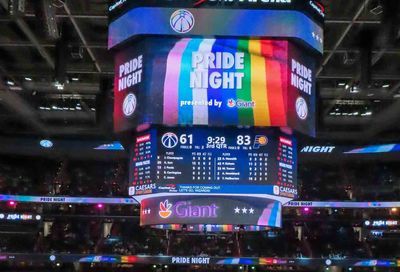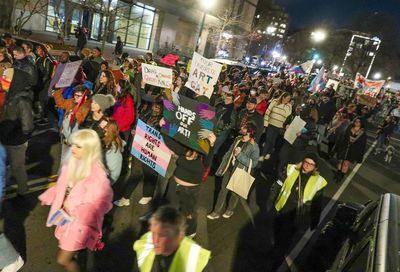Mizeur Makes It Official
Out Democratic Del. Heather Mizeur launches campaign for Maryland governor
”I believe it’s time that we fundamentally change the way we do business, the way we govern,” says Mizeur, speaking with Metro Weekly. ”And it starts with a different kind of campaign. I think the way you campaign is the way you will govern. Are you stuck behind a desk and a keyboard, or are you out in the community with your sleeves rolled up, working side-by-side to tackle our toughest issues?”
Mizeur says her campaign will continue to perform service projects for various causes and community organizations, which will eventually culminate in a policy proposal for the creation of a statewide service corps.
”I’m running for governor because I see limitless possibilities in what we can come together to accomplish,” she says. ”When I do something, I’m all in. I’m not someone who just says the right things or votes the right way. I put all of my energy, focus and attention to working to build coalitions of like-minded supporters around guaranteeing success on a particular initiative.”
In describing her campaign platform, Mizeur lists a number of priorities, including job creation, educational improvements, protecting the environment, preventive health care, food security and criminal-justice reform.
She also highlights her legislative successes backing marriage equality, both in the General Assembly and as a supporter of the Question 6 referendum that upheld the marriage law; in expanding health care coverage to 50,000 children; and in working with Del. Michael Smigiel (R-Caroline, Cecil, Kent, Queen Anne’s counties), head of the Maryland Legislative Tea Party Caucus, to expand family-planning services to low-income women to reduce the abortion rate, save the state $20 million annually, and improve health outcomes for expectant mothers and their children.
Some of those accomplishments seem to be paying off, with Mizeur announcing July 22 an endorsement from the Women’s Campaign Fund (WCF), a nonpartisan organization dedicated to increasing the number of women in office who support reproductive-health choices.
”We are supporting Delegate Mizeur for Governor because of her impressive record standing up for Maryland women and families,” WCF president and CEO Sam Bennett said in a statement. ”Her demonstrated leadership while in the Maryland House of Delegates is precisely the kind of leadership Marylanders need to see in Annapolis.”
Some have speculated whether Mizeur’s candidacy, particularly given its historic nature, will be endorsed by LGBT organizations. Denis Dison, spokesman for the Victory Fund, the national organization dedicated to electing qualified LGBT candidates, declined to comment on Mizeur’s bid for governor, explaining that the Victory Fund ”does not publicly discuss candidates and campaigns unless and until they are endorsed by our board.”
Endorsements aside, Mizeur says she sees plenty of support for her campaign.
”There is a ton of energy and enthusiasm about many aspects of this race,” says Mizeur. ”Women’s groups and LGBT groups are very excited about the opportunity to break this barrier. I’ve continued to say that I’m running to make a difference, not to make history, but it’s very exciting to have an opportunity to lay that path.
”What I find on the campaign trail, it’s a mix of people who are incredibly enthusiastic about it, because they would wear it as a sign of pride that Maryland has arrived and has a woman governor, and would be the first to have an openly gay governor. Or, for some people, it just, quite frankly, doesn’t matter. That’s the least interesting thing about me. They’re more excited about my vision of the future of the state or the different kind of campaign I’m running.”
While Mizuer says voters don’t appear to focus on her sexual orientation, Eberly, the political science professor, said he believes Mizeur will face the same obstacles many LGBT candidates face – discrimination and prejudice.
”First, you have the folks with a 1950s (or 1850s) mindset who are convinced there is something unnatural or immoral about the LGBT ‘lifestyle,”’ said Eberly. ”Those folks will simply not vote for an LGBT candidate. Then comes the indirect discrimination. It comes from folks who harbor no prejudice or ill will toward the LGBT community. Among those folks, some will be very worried that an LGBT candidate would be weaker in the general election because of the direct discrimination of those who are prejudiced. That concern may lead many to vote for the candidate deemed to be ‘the most electable.’ I see it as an extra hurdle that LGBT candidates must overcome.”
However potential supporters – or detractors – may want to examine her candidacy, Mizeur says she is prepared.
”In rough-and-tumble politics, people are open to be dissected and attacked from a variety of standpoints, most of which are usually unfair characterizations, and represent the fear of the attacker,” says Mizeur. ”I have very thick skin. I don’t look outside of myself to external forces for approval. … I have a very strong spirit of countering fear with love, and showing people a different way.”
Support Metro Weekly’s Journalism
These are challenging times for news organizations. And yet it’s crucial we stay active and provide vital resources and information to both our local readers and the world. So won’t you please take a moment and consider supporting Metro Weekly with a membership? For as little as $5 a month, you can help ensure Metro Weekly magazine and MetroWeekly.com remain free, viable resources as we provide the best, most diverse, culturally-resonant LGBTQ coverage in both the D.C. region and around the world. Memberships come with exclusive perks and discounts, your own personal digital delivery of each week’s magazine (and an archive), access to our Member's Lounge when it launches this fall, and exclusive members-only items like Metro Weekly Membership Mugs and Tote Bags! Check out all our membership levels here and please join us today!






















